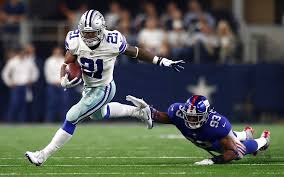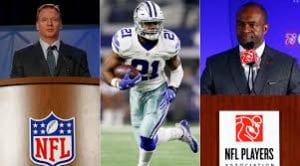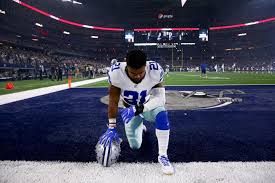Background: It can probably be ascertained by the title that this blog post is a follow up from an earlier post. Before writing this post Liz and I had a discussion about the case. Liz was firmly of the opinion that Ezekiel Elliot was wronged and the suspension was, for lack of a better word, bogus. Her opinion didn’t reach the merits of the case, rather it ridiculed the way the NFL went about the investigation that led up to Elliott’s suspension. I, however, was not easily persuaded. I have a big advocate for domestic violence and found it hard to take Elliot’s story as truth. So, like any lawyer or law student, I delve into the facts and conducted approximately two weeks of research. I combed through articles, read opinions, and watched videos on the subject. My opinion changed only slightly. However, looking at the investigation, from the Ohio prosecutor to the NFL, it was plagued with injustice. By the end, I had to agree with Liz. Not for the merits but for the injustice and truly appalling nature of the investigation.

In recent weeks Ezekiel Elliot, running back for the Dallas Cowboys, has gone through litigation over being accused of committing domestic violence against an alleged ex-girlfriend last year in Ohio. Ironically, the Ohio prosecutor and law enforcement officials decided not to criminally prosecute Elliot due to the “conflicting and inconsistent information across all incidents.” Shocking to some and unsurprising to others, the National Football League (NFL) mounted an investigation and sentenced Elliot to a six-game suspension. Elliot appealed the NFL’s decision to an arbitrator. The arbitrator ruled in favor of the NFL. Elliot appealed the ruling to the United States District Court in the Eastern District of Texas, Sherman Division. In the appeal, Elliot argued the fairness of the arbitration hearing, and asked the court to determine whether Elliot received a fundamentally fair arbitration hearing. The merits of the case, which would determine whether there was credible evidence of domestic abuse, were not addressed to the court. Interestingly enough, whether you feel that suspension was warranted or not, there is a stench of injustice that seeps out of the NFL investigation and the arbitration.

When the NFL mounted its investigation they enlisted Kia Roberts, Director of Investigations, and Lisa Friel, Senior Vice President and Special Counsel for Investigations, to preside over the investigation. Roberts and Friel assembled the NFL Investigation Report (“Report”). Roberts’ role in the investigation was to speak with various witnesses, including interviewing the accuser and accused and reviewing some of the documentary evidence. Roberts interviewed Elliot and the accuser and claims that Friel took more of a supervisory role. Friel stated that she interviewed the two doctors and Elliot. However, Friel admits that the she never interviewed the accuser. At the end of the investigation Roberts and Friel compiled their reports. Each, Friel and Roberts, developed an opinion on the evidence and the credibility of the witnesses. Roberts’ opinion was that there was insufficient evidence to corroborate the allegations of the accuser. Roberts communicated the opinion to Friel. However, Friel concluded that there was sufficient evidence to corroborate the allegations. Suspiciously, in a departure of past investigations, neither opinion from Friel or Roberts were included in the report. Friel, surprisingly, with counsel and with not Roberts, made the joint decision to exclude the opinions from the report.
After Commissioner Goodell received the Report, he met with NFL personnel, including Friel, but uncharacteristically excluded Roberts. During this meeting, Friel communicated her opinions. However, Roberts’ opinions were, plainly stated, not shared. It would be safe to say that Roberts’ crucial and contradictory opinion was not shared with the Commissioner Goodell or his advisors.
While preparing for the arbitration, Elliot and his counsel requested that the arbitrator, Harold Henderson, order the NFL to provide the accuser for cross-examination, along with the investigative notes. Henderson denied the request, stating, “the commissioner’s decision in the case was based on affidavits, statements, and interview reports, all available to Mr. Elliot.” Additionally, Elliot’s legal team asked Henderson to order the NFL to provide Roberts to testify about his opinion and investigation, which was granted. After a three-day arbitration, Henderson concluded that the suspension should be upheld. It is curious that the arbitrator would deny a motion that is so pertinent to the arbitration. Under the law, arbitrators must ensure that each party has all relevant documentary evidence. See Universial Comput. Sys., Inc. v. Big Bell 21, LLC, No.13-cv-00702, 2014 WL 12603178, at *4 (S.D. Tex. Jan. 29, 2014) (emphasis added). While arbitrators do have discretion to the denial of witnesses and documents, it is hard to make a logical argument when key witnesses and documents are intentionally left out. What this basically amounts to is signing up for a class, but not being given the book the teacher is using to teach the class.

As it stands, not looking to whether he did it or not, we have to ask ourselves whether justice was served? In my opinion, and that of Judge Mazzant, it was not. I do not go as far as to say that my opinion on the merits of the case and the facts contained in the report are in line with Elliot or the NFL. I merely state that the fairness that must be provided within arbitration failed. I agree with the court in their decision to grant the injunction because Elliot was denied a fundamentally fair hearing by Henderson’s refusal to allow the accuser and Goodell to testify at the arbitration hearing. Elliot is free to play until the court system works through this issue. The NFL believes that it will find favor in the circuit court because of the favor they received in the “de-flate gate” scandal, however, Judge Mazzant distinguished Brady I and Brady II by highlighting the fact that the evidence and testimony precluded was not material, pertinent or critically important. These facts suggest that favor in the circuit court could be hard fought and not as simple as the NFL may think. For now, Elliot plays and it looks like he will continue to play the entire season, and the NFL may have an uphill battle to uphold the suspension.
By: Jourdan J. Dukes
For More Information about the Clinic, Click Here.
